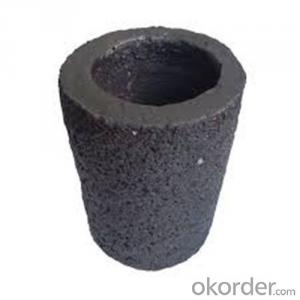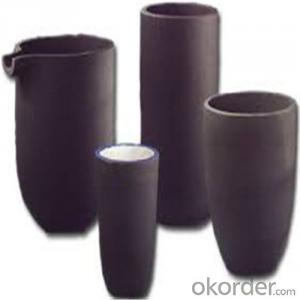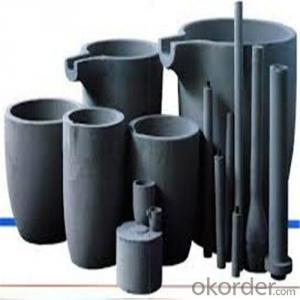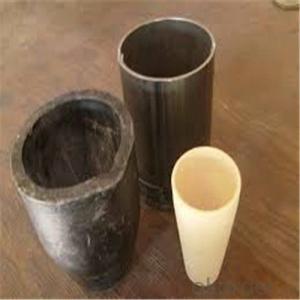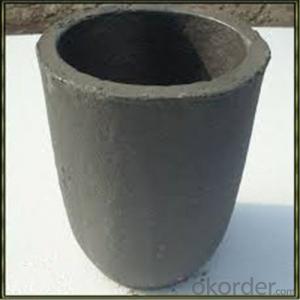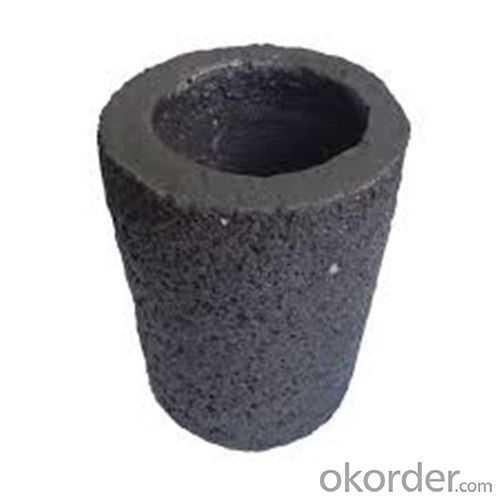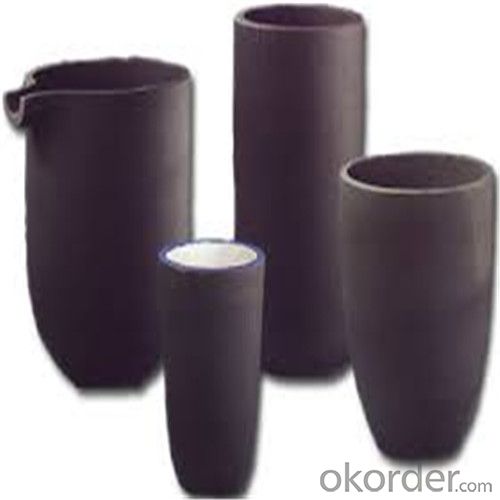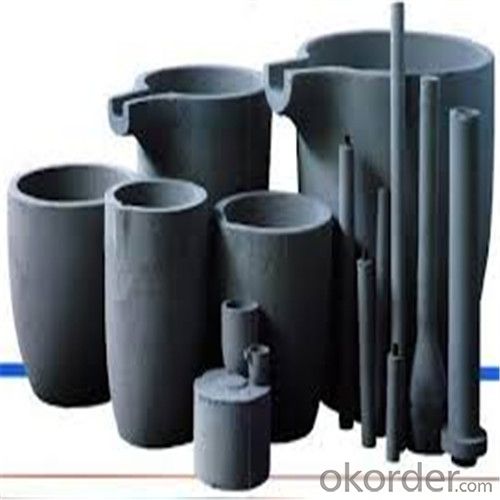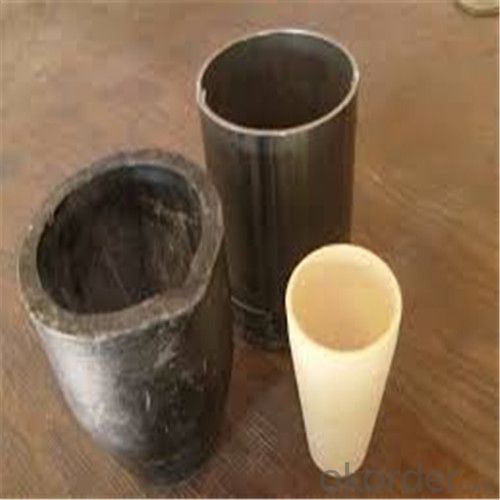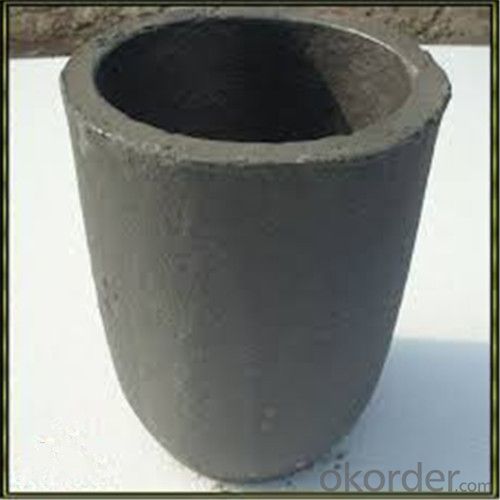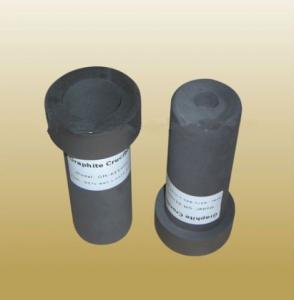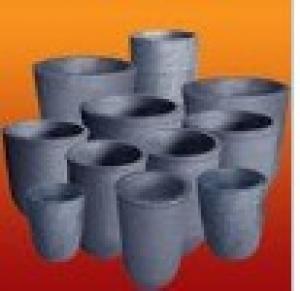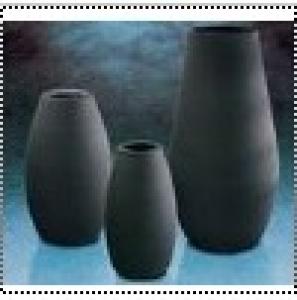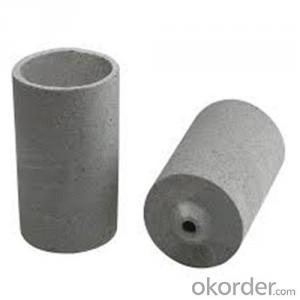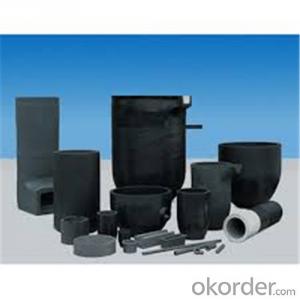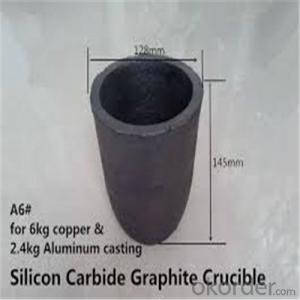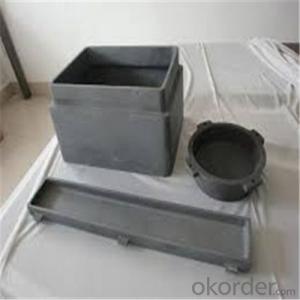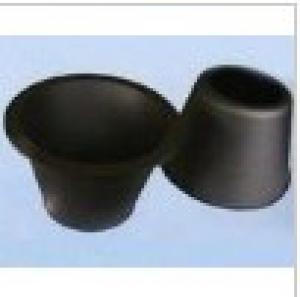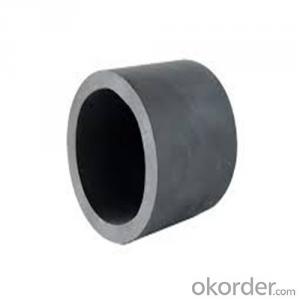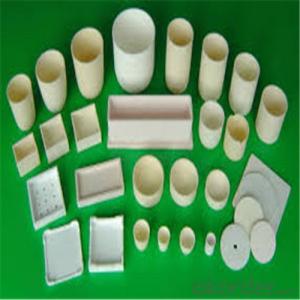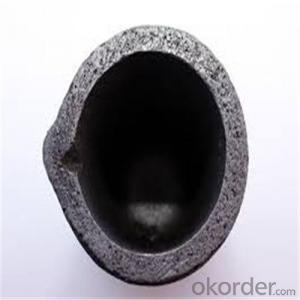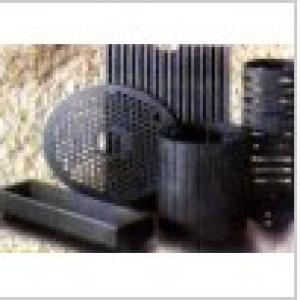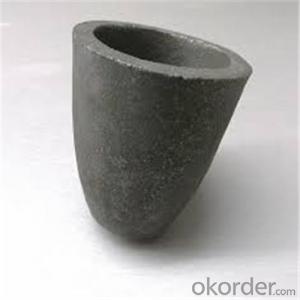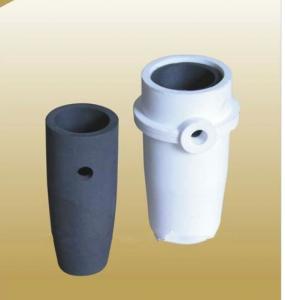5 Kg Graphite Crucible - SIC Crucibles, SIC Graphite Crucible, Graphite Crucible 2024
- Loading Port:
- Shanghai
- Payment Terms:
- TT OR LC
- Min Order Qty:
- 1 pc
- Supply Capability:
- 1000 pc/month
OKorder Service Pledge
OKorder Financial Service
You Might Also Like
Quick Details for SiC Graphite Crucibles
| Type: | High Strength, graphite crucible crucible | Application: | melting metal | Height: | as your requirements |
| Composition: | High Pure | Top Diameter: | 10-600mm | Bottom Diameter: | 10-1000mm |
| Place of Origin: | China (Mainland) | Brand Name: | Model Number: | ||
| Color: | Black grey | Si3N4%: | 5min | Fe2O3%: | 0.7max |
| C%: | 30-45 | Apparent porosity: | 30max | Refractoriness: | 1680 |
| Bulk Density: | 1.71min | Using life: | >5000 hours | MAX temperature: | 1600c |
Packaging & Delivery
| Packaging Details: | Seaworty packing or as per customer's detail requirement of graphite crucible. |
| Delivery Detail: | within 20-30 days after confirm order of graphite cru |
SiC Graphite Crucibles For Melting Aluminium And Copper, Brass
Product Description
Specifications for Graphite Silicon Carbide Crucible For Aluminum Melting :
1.Long working lifetime: its working lifetime is increased 3-5 times over normal clay-crucible due to the compact body formed under high pressure.
2.High thermal conductivity: high-density body and low apparent porosity greatly improve its heat conductivity.
3.New-style materials: new heat conduction material ensures faster heat conductivity and pollution-free product, reduces adherent slag.
4.Resistance to corrosion:better anti-corrosion than normal clay-crucible.
5.Resistance to oxidation: advanced process dramatically improves its oxidation resistance, which ensures persistent heat conductivity and long working lifetime.
6.High-strength: high-density body and logical structure make the product better compression property.
7.Eco-friendly: energy-efficient and pollution-free, not only ensure metal product purity, but also ensure sustainable development on environment.
8.Multi-function: Can be used in induction graphite crucible furnace
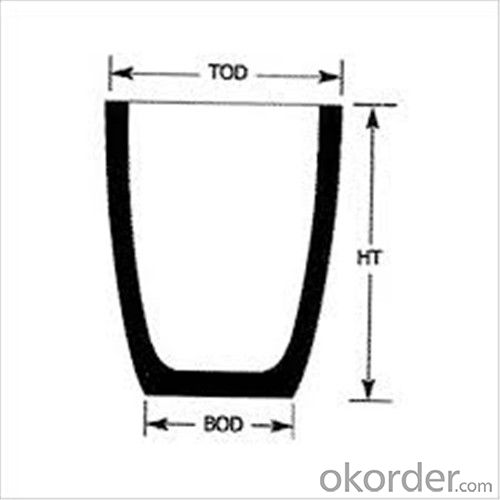
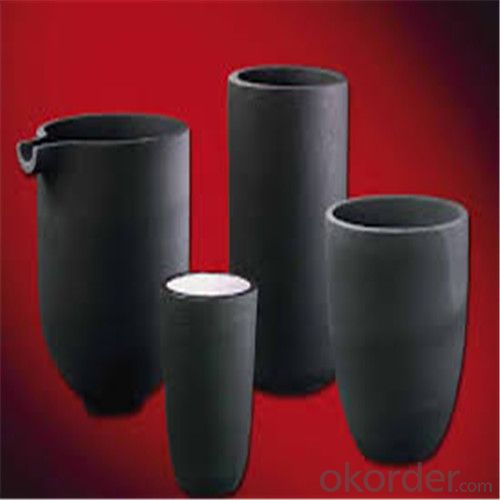
Graphite crucible can withstand the high temperature, and has good resistance to chemical erosions and thermal shock. Especially graphite crucible is ideal for the melting of aluminum, copper and etc.
Bulk Density | g/cc | 1.70-1.88 |
Specific Resistance | μΩ.m | 6.0-15.0 |
Compressive Strength | MPa | 30-80 |
Bending Strength | MPa | 20-45 |
Shore hardness | 30-70 | |
C.T.E.(100-600°C) | x10-6 /°C | 2.5-5.5 |
Ash | % | 0.01-0.2 |
Maximum Grain Size | mm | 0.044-0 |
- Q: Can industrial induction furnaces heat graphite?
- The material can only be guided by magnetism. The magnetic flux can not produce eddy current, so there is no way to generate heat by eddy current.
- Q: Can graphite crucibles be used for precious metal refining?
- Yes, graphite crucibles can be used for precious metal refining. Graphite crucibles are commonly used in the metallurgical industry due to their high temperature resistance and chemical inertness. They can withstand the intense heat required for the refining process and prevent contamination of the precious metals.
- Q: How is a graphite crucible cleaned after use?
- A graphite crucible is typically cleaned after use by first removing any remaining contents, such as molten metal or other substances, by pouring or scraping it out. Then, it can be washed with water or a mild detergent to remove any residual impurities. After washing, it is important to thoroughly dry the crucible to prevent any moisture from causing damage during future uses. Additionally, a crucible may be further cleaned or conditioned using specialized cleaning agents or heat treatment methods, depending on the specific requirements and condition of the crucible.
- Q: Why can't a f containing compound be used in a porcelain crucible, a Lilac Garden?
- The main components of a porcelain crucible are alumina and silica, while fluorine is very oxidizing, and at high temperature fluorine will replace the oxygen in the oxide and corrode the crucible. Although the contents of the crucible may not be sufficient to penetrate the crucible, the accuracy of the experiment will be affected by the fact that the crucible is not dissolved in the content of the component.
- Q: What is the conductivity of graphite and copper, iron and zinc?
- It is necessary to determine the material or grade of the graphite to have the corresponding technical parameters. The letter Ruida graphite thermal field | graphite heater | graphite crucible | isostatic graphite, when processing will also consider these problems, depends on the specific application.
- Q: Is it possible to repair a cracked or damaged graphite crucible?
- Repairing a cracked or damaged graphite crucible is indeed possible, but the success of the repair depends on the extent and location of the damage. Typically, specialized graphite repair compounds or pastes are used to fix these crucibles. These compounds are applied to the cracked or damaged area, and then heated to cure and bond with the existing graphite material. Once repaired, the crucible can be used again for various high-temperature applications. It is worth mentioning that the repair process might not always succeed, particularly if the damage is severe or if the crucible is compromised in a critical area. In such cases, replacing the crucible becomes necessary to guarantee the process's integrity and safety.
- Q: Who is the melting point of graphite and diamond?
- Graphite is a thermodynamically stable structure, while diamond is thermodynamically unstable. Diamond is an atomic crystal, a spatial network structure. Each layer of graphite is netted, and between layers is the intermolecular force, which is the crystal structure between the molecular crystal and the atomic crystal. But because of the bond length, the covalent bond length in the layer of graphite is longer than the bond length of the diamond, and the intermolecular force is greater. The destruction of the chemical bond requires more energy. Agree with this statement. Added, diamond heated to 1900 degrees Celsius will be converted to graphite, graphite more stable.
- Q: Can graphite crucibles be used for carbon and graphite production?
- Yes, graphite crucibles can be used for carbon and graphite production. Graphite crucibles are made from high-purity graphite and are designed to withstand high temperatures and chemical reactions. They have excellent thermal conductivity and can resist thermal shock, making them ideal for applications such as carbon and graphite production. These crucibles can be used in various processes, including melting and refining of carbon and graphite materials. Additionally, graphite crucibles can be reused multiple times, making them a cost-effective choice for carbon and graphite production.
- Q: What is the porcelain crucible with a small hole under it?
- The crucible can be divided into three categories: graphite crucible, clay crucible and metal crucible. In the graphite crucible, there are three kinds of universal graphite crucible and special graphite crucible and high-purity graphite crucible. Various types of graphite crucibles, because of their performance, application and application conditions, are different in raw materials, production methods, process technology and product models and specifications.
- Q: What is the maximum temperature that a graphite crucible can withstand?
- The specific type and quality of graphite material used can cause variations in the maximum temperature that a graphite crucible can endure. Typically, graphite crucibles are engineered to withstand remarkably high temperatures, usually falling between 2000 and 3000 degrees Celsius (3632 to 5432 degrees Fahrenheit). However, it is crucial to bear in mind that extended exposure to temperatures at the upper extremity of this range may potentially result in harm or deterioration to the graphite crucible over time. Consequently, it is advisable to meticulously adhere to the manufacturer's guidelines and specifications in order to prevent exceeding the crucible's maximum temperature limit.
Send your message to us
5 Kg Graphite Crucible - SIC Crucibles, SIC Graphite Crucible, Graphite Crucible 2024
- Loading Port:
- Shanghai
- Payment Terms:
- TT OR LC
- Min Order Qty:
- 1 pc
- Supply Capability:
- 1000 pc/month
OKorder Service Pledge
OKorder Financial Service
Similar products
Hot products
Hot Searches
Related keywords
